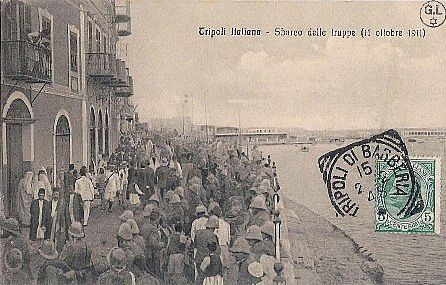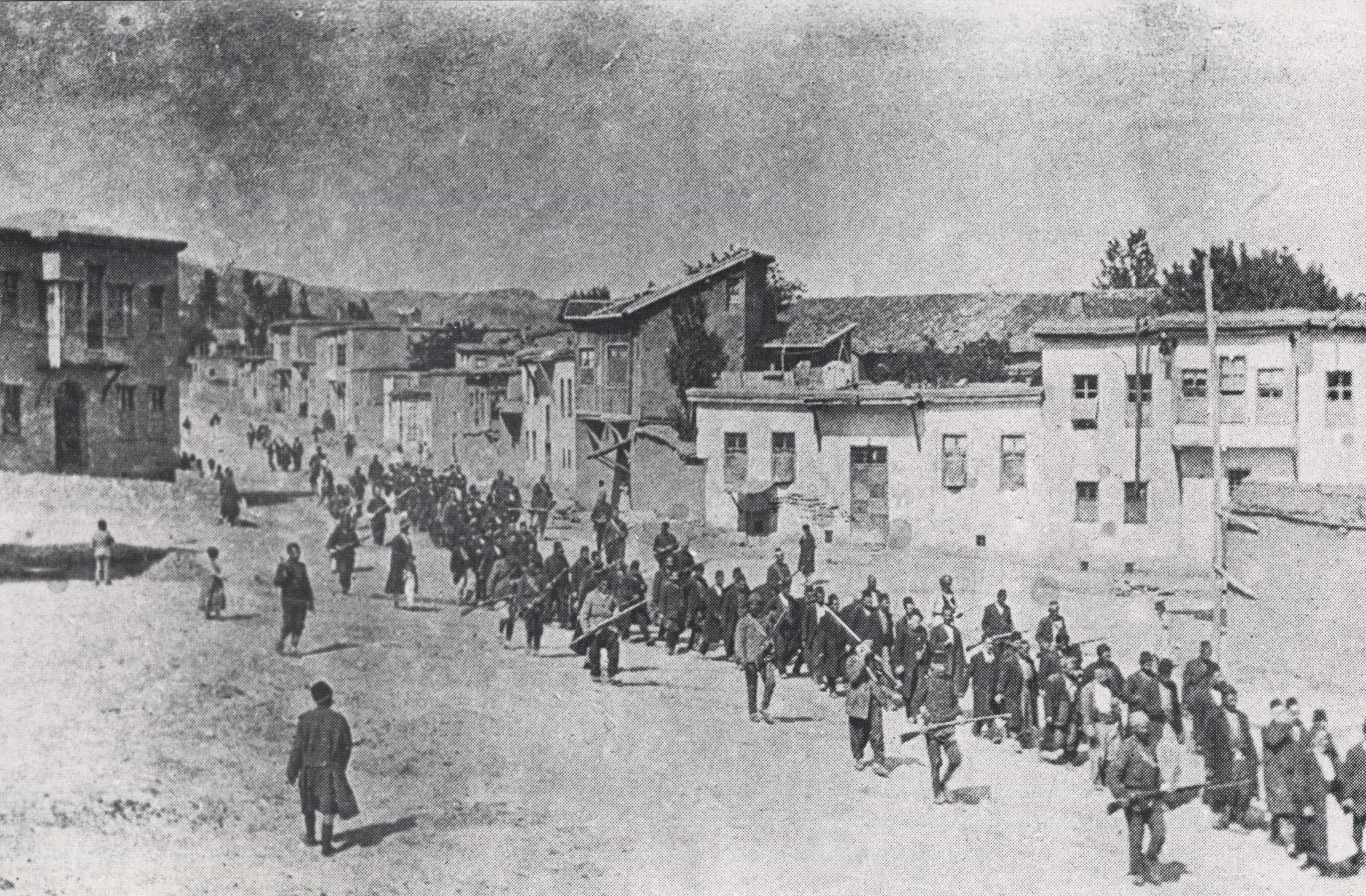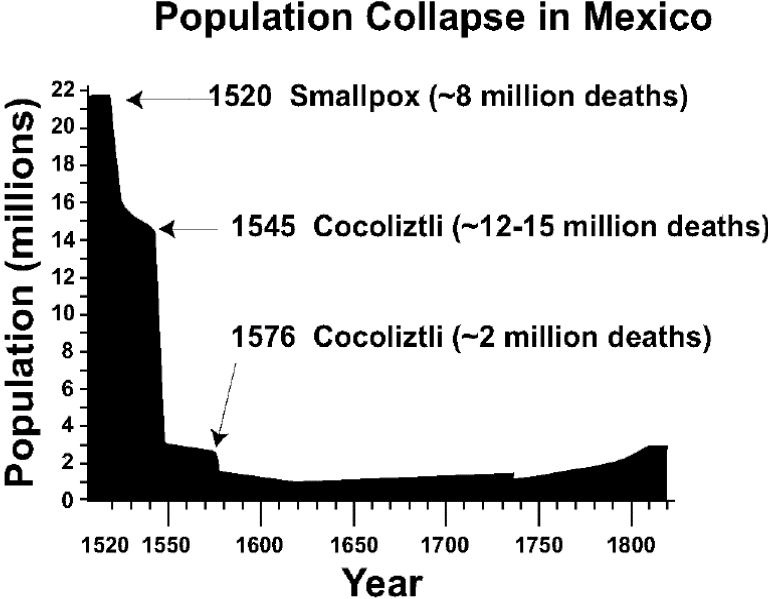|
Libyan Genocide (1929–1934)
The Libyan genocide, also known in Libya as Shar (), was the genocide of Libyan Arabs and the systematic destruction of Libyan culture during and after the Second Italo-Senussi War between 1929 and 1934. During this period, between 20,000 and 100,000 Libyans were killed by Italian colonial authorities under Benito Mussolini. Near 50% of the population of Cyrenaica was deported and interned in concentration camps, resulting in a population decline from 225,000 to 142,000 civilians. This period was marked by a brutal campaign characterized by widespread major Italian war crimes, including ethnic cleansing, mass killings, forced displacement, forced death marches, settler colonialism, the use of chemical weapons, the use of concentration camps, mass executions of civilians and refusing to take prisoners of war and instead executing surrendering combatants. The indigenous population, particularly the nomadic Bedouin tribes, faced extreme violence and suppression in an attempt t ... [...More Info...] [...Related Items...] OR: [Wikipedia] [Google] [Baidu] |
Italian Libya
Libya (; ) was a colony of Fascist Italy (1922–1943), Italy located in North Africa, in what is now modern Libya, between 1934 and 1943. It was formed from the unification of the colonies of Italian Cyrenaica, Cyrenaica and Italian Tripolitania, Tripolitania, which had been Italian colonial empire, Italian possessions since 1911. From 1911 until the establishment of a unified colony in 1934, the territory of the two colonies was sometimes referred to as "Italian Libya" or Italian North Africa (''Africa Settentrionale Italiana'', or ASI). Both names were also used after the unification, with Italian Libya becoming the official name of the newly combined colony. Through its history, various infrastructure projects, most notably roads, Rail transport in Libya, railways and villages were set up, as well as archeology. It had a population of around 150,000 Italian settlers in Libya, Italians. The Italian colonies of Tripolitania and Cyrenaica were taken by Italy from the Ottoman E ... [...More Info...] [...Related Items...] OR: [Wikipedia] [Google] [Baidu] |
Italian Fascism
Italian fascism (), also called classical fascism and Fascism, is the original fascist ideology, which Giovanni Gentile and Benito Mussolini developed in Italy. The ideology of Italian fascism is associated with a series of political parties led by Mussolini: the National Fascist Party (PNF), which governed the Kingdom of Italy from 1922 until 1943, and the Republican Fascist Party (PFR), which governed the Italian Social Republic from 1943 to 1945. Italian fascism also is associated with the post–war Italian Social Movement (MSI) and later Italian Neo-fascism, neo-fascist political organisations. Italian fascism originated from ideological combinations of ultranationalism and Italian nationalism, national syndicalism and revolutionary nationalism, and from the militarism of Italian irredentism to regain "lost overseas territories of Italy" deemed necessary to restore Italian nationalist pride.Aristotle A. Kallis. ''Fascist ideology: territory and expansionism in Italy and Ger ... [...More Info...] [...Related Items...] OR: [Wikipedia] [Google] [Baidu] |
Death March
A death march is a forced march of prisoners of war, other captives, or deportees in which individuals are left to die along the way. It is distinct from simple prisoner transport via foot march. Article 19 of the Geneva Convention requires that prisoners must be moved away from a danger zone such as an advancing front line, to a place that may be considered more secure. It is not required to evacuate prisoners who are too unwell or injured to move. In times of war, such evacuations can be difficult to carry out. Death marches usually feature harsh physical labor and abuse, neglect of prisoner injury and illness, deliberate starvation and dehydration, humiliation, torture, and execution of those unable to keep up the marching pace. The march may end at a prisoner-of-war camp or internment camp, or it may continue until all those who are forced to march are dead. Notable death marches Jingkang incident In 1127, during the Jin–Song wars, the forces of the Jurchen-led ... [...More Info...] [...Related Items...] OR: [Wikipedia] [Google] [Baidu] |
Mass Killing
Mass killing is a concept which has been proposed by genocide scholars who wish to define incidents of non-combat killing which are perpetrated by a government or a state. A mass killing is commonly defined as the killing of group members without the intention to eliminate the whole group, or otherwise the killing of large numbers of people without a clear group membership. ''Mass killing'' is used by a number of genocide scholars because ''genocide'' (its strict definition) does not cover mass killing events in which no specific ethnic or religious groups are targeted, or events in which perpetrators do not intend to eliminate whole groups or significant parts of them. Genocide scholars use different models in order to explain and predict the onset of mass killing events. There has been little consensus and no generally-accepted terminology, prompting scholars, such as Anton Weiss-Wendt, to describe comparative attempts a failure. Genocide scholarship rarely appears in mainstrea ... [...More Info...] [...Related Items...] OR: [Wikipedia] [Google] [Baidu] |
War Crime
A war crime is a violation of the laws of war that gives rise to individual criminal responsibility for actions by combatants in action, such as intentionally killing civilians or intentionally killing prisoners of war, torture, taking hostages, unnecessarily destroying civilian property, deception by perfidy, wartime sexual violence, pillaging, and for any individual that is part of the command structure who orders any attempt to committing mass killings (including genocide or ethnic cleansing), the granting of no quarter despite surrender, the conscription of children in the military, and flouting the legal Indiscriminate attack, distinctions of Proportionality (law), proportionality and military necessity. The formal concept of war crimes emerged from the codification of the customary international law that applied to warfare between sovereign states, such as the Lieber Code (1863) of the Union Army in the American Civil War and the Hague Conventions of 1899 and 1907 for int ... [...More Info...] [...Related Items...] OR: [Wikipedia] [Google] [Baidu] |
Population Decline
Population decline, also known as depopulation, is a reduction in a human population size. Throughout history, Earth's total world population, human population has estimates of historical world population, continued to grow but projections suggest this long-term trend may be coming to an end. From antiquity until the beginning of the Industrial Revolution, the global population grew very slowly, at about Estimates of historical world population, 0.04% per year. After about 1800, the growth rate accelerated to a peak of 2.1% annually during the 1962–1968 period, but since then, due to the worldwide collapse of the total fertility rate, it has slowed to 0.9% as of 2023. The global growth rate in absolute numbers accelerated to a peak of 92.8 million in 1990, but has since slowed to 70.4 million in 2023. Human population projections, Long-term projections indicate that the growth rate of the human population of the planet will continue to slow and that before the end of the 21st ... [...More Info...] [...Related Items...] OR: [Wikipedia] [Google] [Baidu] |
Concentration Camps
A concentration camp is a prison or other facility used for the internment of political prisoners or politically targeted demographics, such as members of national or ethnic minority groups, on the grounds of national security, or for exploitation or punishment. Prominent examples of historic concentration camps include the British confinement of non-combatants during the Second Boer War, the mass internment of Japanese-Americans by the US during the Second World War, the Nazi concentration camps (which later morphed into extermination camps), and the Soviet labour camps or gulag. History Definition The term ''concentration camp'' originates from the Spanish–Cuban Ten Years' War when Spanish forces detained Cuban civilians in camps in order to more easily combat guerrilla forces. Over the following decades the British during the Second Boer War and the Americans during the Philippine–American War also used concentration camps. The term "concentration camp" and "inter ... [...More Info...] [...Related Items...] OR: [Wikipedia] [Google] [Baidu] |
Cyrenaica
Cyrenaica ( ) or Kyrenaika (, , after the city of Cyrene), is the eastern region of Libya. Cyrenaica includes all of the eastern part of Libya between the 16th and 25th meridians east, including the Kufra District. The coastal region, also known as ''Pentapolis'' ("Five Cities") in antiquity, was part of the Roman province of Crete and Cyrenaica, later divided into ''Libya Pentapolis'' and ''Libya Sicca''. During the Islamic period, the area came to be known as ''Barqa'', after the city of Barca. Cyrenaica became an Italian colony in 1911. After the 1934 formation of Italian Libya, the Cyrenaica province was designated as one of the three primary provinces of the country. During World War II, it fell under British military and civil administration from 1943 until 1951, and finally in the Kingdom of Libya from 1951 until 1963. The region that used to be Cyrenaica officially until 1963 has formed several shabiyat, the administrative divisions of Libya, since 1995. ... [...More Info...] [...Related Items...] OR: [Wikipedia] [Google] [Baidu] |
Benito Mussolini
Benito Amilcare Andrea Mussolini (29 July 188328 April 1945) was an Italian politician and journalist who, upon assuming office as Prime Minister of Italy, Prime Minister, became the dictator of Fascist Italy from the March on Rome in 1922 until Fall of the Fascist regime in Italy, his overthrow in 1943. He was also of Italian fascism from the establishment of the Italian Fasces of Combat in 1919, until Death of Benito Mussolini, his summary execution in 1945. He founded and led the National Fascist Party (PNF). As a dictator and founder of fascism, Mussolini inspired the List of fascist movements, international spread of fascism during the interwar period. Mussolini was originally a socialist politician and journalist at the Avanti! (newspaper), ''Avanti!'' newspaper. In 1912, he became a member of the National Directorate of the Italian Socialist Party (PSI), but was expelled for advocating military intervention in World War I. In 1914, Mussolini founded a newspaper, ''Il P ... [...More Info...] [...Related Items...] OR: [Wikipedia] [Google] [Baidu] |
Culture Of Libya
Libyan culture is a blend of many influences, due to its exposure to many historical eras. Libya was an Italian colony for over four decades, which also had a great impact on the country's culture. Once an isolated society, Libyans succeeded in preserving their traditional folk customs alive today, now recognized by many as the most "pure" extant form of Arab culture found outside the Arabian Peninsula. Libyan culture places strong emphasis on family, tribal bonds, loyalty, solidarity and faithfulness. The majority of Libyans are Arab, and 96.6% are Sunni Muslims. The predominantly spoken language in Libya is Arabic. Italian, and English are spoken in a minor level and in tourist areas. 95% of the country is desert and 90% of the Libyan population inhabit the coastline region as a result. Flag In February 2011, when the Libyan revolution took place, the national Transition Council reintroduced the old flag used by the kingdom prior to Gaddafi’s military coup in 1969.Witherbe ... [...More Info...] [...Related Items...] OR: [Wikipedia] [Google] [Baidu] |
Libyans
Demographics of Libya is the demography of Libya, specifically covering population density, Ethnic group, ethnicity, and Religion in Libya, religious affiliations, as well as other aspects of the Libyan population. All figures are from the United Nations Demographic Yearbooks, unless otherwise indicated. The Libyan population resides in the country of Libya, a territory located on the Mediterranean coast of North Africa, to the west of and adjacent to Egypt. Tripoli, Libya, Tripoli is the capital of the country and is the city with the largest population. Benghazi is Libya's second largest city. History Historically Berbers, Berber, over the centuries, Libya has been occupied by the Phoenicians, Greeks, Ancient Rome, Romans, Arabs, and Italians. The Phoenicians had a big impact on Libya. Many of the coastal towns and cities of Libya were founded by the Phoenicians as trade outposts within the southern Mediterranean coast in order to facilitate the Phoenician business activi ... [...More Info...] [...Related Items...] OR: [Wikipedia] [Google] [Baidu] |
Genocide
Genocide is violence that targets individuals because of their membership of a group and aims at the destruction of a people. Raphael Lemkin, who first coined the term, defined genocide as "the destruction of a nation or of an ethnic group" by means such as "the disintegration of [its] political and social institutions, of [its] cultural genocide, culture, linguicide, language, national feelings, religious persecution, religion, and [its] economic existence". During the struggle to ratify the Genocide Convention, powerful countries restricted Lemkin's definition to exclude their own actions from being classified as genocide, ultimately limiting it to any of five "acts committed with intent to destroy, in whole or in part, a national, ethnical, racial or religious group". While there are many scholarly Genocide definitions, definitions of genocide, almost all international bodies of law officially adjudicate the crime of genocide pursuant to the Genocide Convention. Genocide has ... [...More Info...] [...Related Items...] OR: [Wikipedia] [Google] [Baidu] |








